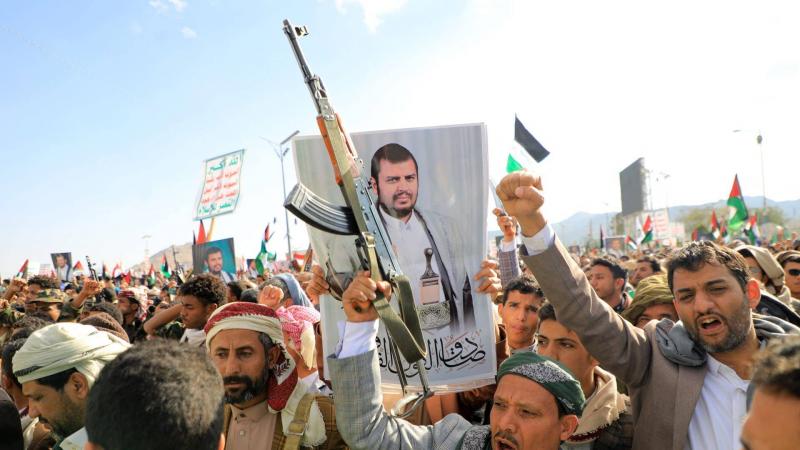The violent strikes ordered by U.S. President Joe Biden against Yemen came after weeks of warnings to the Houthi movement to cease attacks on ships in the Red Sea or face consequences. Despite these warnings, the Houthis continued to fire drones and missiles, prompting the United States to seemingly carry out its threats. This has raised questions among some experts: Did the Houthis want war with the United States? If so, why? Gerald Feierstein, former U.S. ambassador to Yemen, is one of those who believes that Washington granted the Houthis exactly what they desired: to fight. Feierstein told Reuters, “They were definitely trying to provoke a retaliatory response from the United States.” He added, “They were confident in their ability to withstand anything we might do. They saw that they had popular support.”
The Houthi movement, which has controlled large areas of Yemen for nearly a decade, claimed that five fighters were killed after a total of 73 airstrikes. They vowed to retaliate and continue their attacks on shipping operations, which they claim aim to support Palestinians against Israel. The U.S. military announced late Friday night that it had carried out another strike targeting a radar site. Following the initial U.S. and British strikes, drone footage broadcast by the Houthi-affiliated Al-Masirah channel showed hundreds of thousands gathering in Sanaa chanting slogans condemning Israel and the United States. Crowds also gathered in other Yemeni cities.
Experts say a significant amount of the Houthis' confidence comes from their resistance to Saudi attacks over the years. However, the campaign led by the United States against the movement may be entirely different. U.S. Lieutenant General Douglas Sims, director of operations at the Joint Chiefs of Staff, told reporters on Thursday that the strikes targeted 28 sites with more than 150 munitions. When assessing the damage, he expressed hope that the Houthis did not cause such destruction. He added, "I think if you were operating a ballistic missile launcher last night, you certainly wouldn’t want to carry out the strike. But, no, I wish they didn’t want us to carry out the attacks.”
Abd al-Malik al-Houthi, the enigmatic leader of the Houthi fighters, claims descent from the Prophet Muhammad. He emphasizes in speeches and recorded statements that his movement is under siege due to religion. Al-Houthi has gained a reputation as a strong leader on the battlefield before becoming the leader of the Houthis, who have fought against a Saudi-led military coalition since 2015. This conflict has resulted in the deaths of tens of thousands, devastated Yemen's economy, and pushed millions into hunger. Under al-Houthi's guidance, the group has recruited tens of thousands of fighters and possesses a massive arsenal of drones and ballistic missiles, largely supplied by Iran.
Following the strikes, Sims and other U.S. officials acknowledged that the Houthis might proceed with their threats of retaliation. The U.S. Department of Defense reported that the Houthis launched a ballistic missile targeting ships in the Red Sea. An American official, speaking on the condition of anonymity, indicated that far from deterring them, the Houthis might perceive a relatively low number of their casualties in these strikes as a success for the group, even if it leads to a reduction in their capabilities. The official added, "A person's definition of success really depends on their perspective."
As tensions rise, the price of Brent crude oil increased by one percent on Friday due to concerns about potential supply disruptions. Data tracking commercial ships showed that at least nine oil tankers had stopped or diverted away from the Red Sea.
### More Strikes?
Michael Mulroy, former Deputy Assistant Secretary of Defense for Middle East Affairs during the previous U.S. administration, stated that the Pentagon should prepare for additional military action. He continued, "The United States needs to start planning to escalate our response to any further attacks in the Red Sea or Syria or Iraq." He added, "The Iranian Revolutionary Guard should be included among those targets." Iran supports the Houthi movement as part of the regional “Axis of Resistance,” which comprises Iran-aligned groups, including Hamas and armed factions in Iraq and Syria.
The United States accuses Iran of supporting Houthi attacks in the Red Sea and providing them with military and intelligence capabilities to execute these. The Houthis deny being puppets of Tehran, asserting that they are fighting a corrupt regime and regional aggression. Nonetheless, Feierstein warns that the Houthis' challenge to the United States and its allies helps polish their image in the Middle East, a concern shared by some current U.S. officials. He said, "It enhances the Houthis' image regionally. It puts them at the forefront among Iran's allies in the Axis of Resistance." He added, "We should not give the Houthis what they want, and that is exactly what we did."




